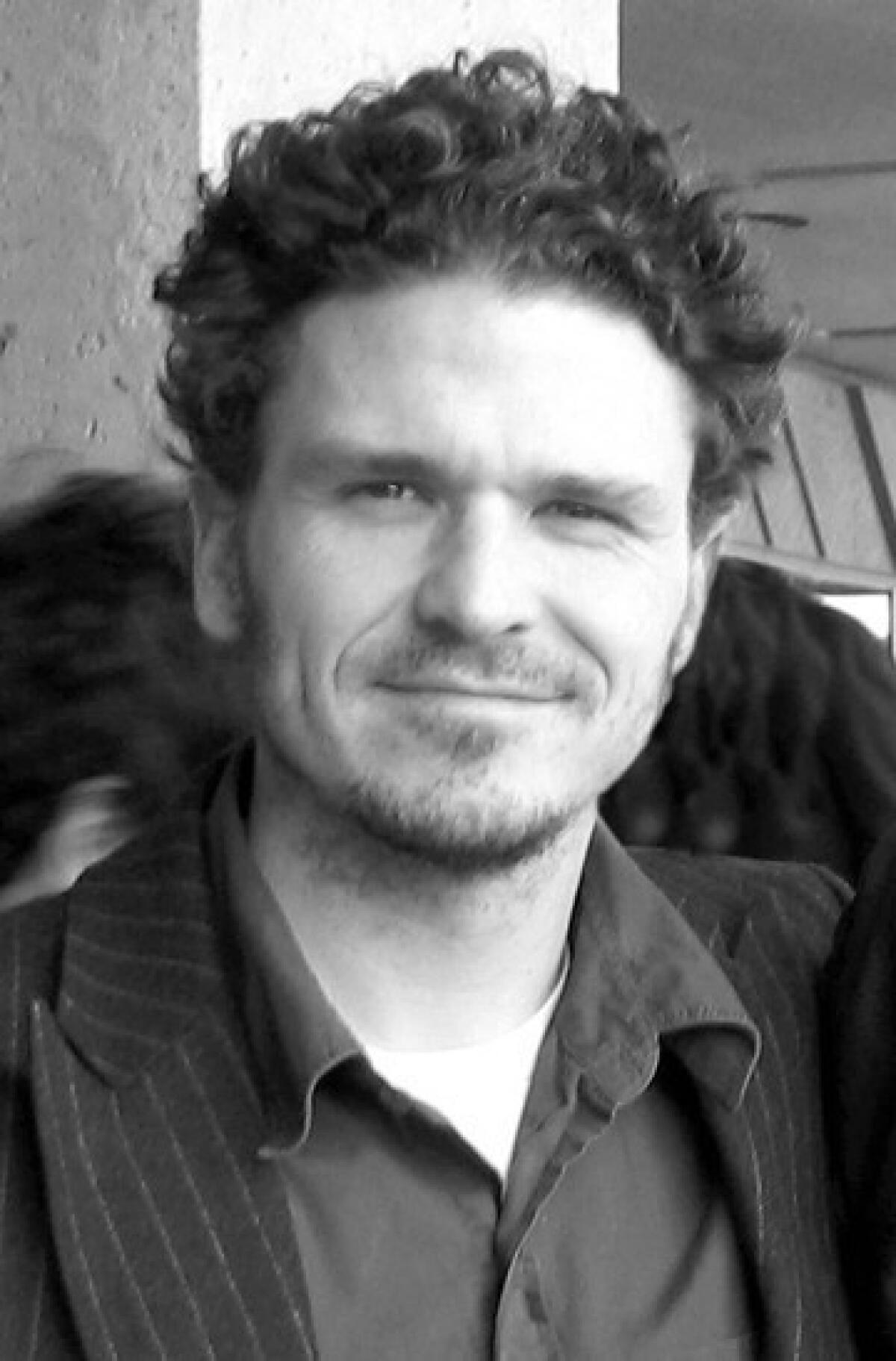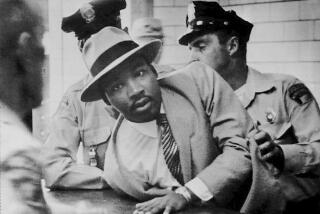Review: ‘A Hologram for the King’ by Dave Eggers worth discussing

- Share via
A Hologram for the King
A Novel
Dave Eggers
McSweeney’s: 328 pp., $25
More than any other writer of his generation, Dave Eggers is a brand. The 42-year-old author is accomplished in many fields — he’s the founder of McSweeney’s, a successful independent publishing house and innovative literary journal that grew out of a still-vital humor website. He’s the head of the multi-city literacy nonprofit 826, which is partly supported by whimsical storefronts like the Brooklyn Superhero Supply Store. For his work, he’s been awarded the TED Prize, the Heinz Award and the Los Angeles Times Book Prize Innovators Award. Yet inside all of that is Eggers the writer, who’s publishing his first novel of pure invention in a decade, “A Hologram for the King.”
Lately, when he’s not writing screenplays, Eggers has written bestselling books with a strong sense of social justice that are true or based in truth. The nonfiction “Zeitoun” (2009) is about a Syrian American who, despite valiant actions after Hurricane Katrina, wound up locked away in isolation; “What Is the What” (2006) is the novelized autobiography of Valentino Achak Deng, a “lost boy” of Sudan.
There is no wronged man in the fictional departure “A Hologram for the King” — instead our protagonist is Alan Clay, a 54-year-old American whose circumstances are because of his own choices, or bad luck, or a destiny he failed to see coming.
In the wake of the 2008 recession, Clay is a former upper middle class salesman whose job evaporated and whose income as a consultant has dwindled to an unsustainable pittance. He is divorced, indebted, trying to sell his home so he can pay for his daughter’s second year of college. His vices are mild — he’ll drink too much and rewatch Red Sox championship games — and he’s not degenerate, but he is close to desperate. He’s got an opportunity, a one-last-chance kind, to close a major IT deal in Saudi Arabia; if he can pull it off, his commission will be enough to keep body and soul together, or at least get him back in the black.
This is a classic action setup, but the action here is subtle: Clay waits. He waits for King Abdullah to come; every day, he travels to the remote, unbuilt, ambitious metropolis envisioned by the king, the KAEC. Rather than being welcomed into a completed office building, he is relegated to a tent, where his much-younger staffers idle away in the heat. To them, Clay is “more burden than boon, more harm than good, irrelevant, superfluous to the forward progress of the world.” Although he has occasional blasts of a salesman’s bravado and optimism, he generally believes they are right.
The novel is solidly constructed and elegantly told. There is nothing inaccessible about it, but it may be difficult for some because it is so deeply forlorn. That stands in contrast to Eggers’ first book, the monumental memoir “A Heartbreaking Work of Staggering Genius,” which despite dealing with serious issues was a delightful, giddy, exuberant work. The tone of this book is so far away, so somber, that it is almost to suggest that “Heartbreaking Work,” published in 2000, may have been the result of, to borrow a phrase from Alan Greenspan, irrational exuberance.
Clay may not be like each of us, but he is an everyman whose irrelevancy is parallel to America’s own. We learn that the company he worked for was Schwinn, that he helped it move from making bicycles in the U.S. to China, which led to its downfall and bankruptcy. This cycle, of American ingenuity and commitment being shipped offshore, is reflected again and again in the book: in the anecdotes of architects, in the possible competitors for the contract, in the slow unwrapping of Clay’s past.
When America hasn’t moved aside, it’s simply given up. Clay feels like he should do something, but what? “I sold bikes, he would say,” he imagines saying to an astronaut near the end ofNASA’sshuttle program. “I sold capitalism to communists. Let me sell the Shuttle. I will help you get to Mars. Give me something to do.”
In Saudi Arabia, Clay eddies through his days hitting like a classic fictional businessman abroad: He goes to an embassy party, tangles with expats, drinks to excess, befriends his chatty driver and gets out of town to see the country in its raw, undeveloped state. While these may be familiar notes, Eggers, to his credit, underplays them. In the acknowledgments, Eggers thanks a number of people in Saudi Arabia, and the book seems informed by his skilled observation, a subtly explicated sense of culture and place. On top of that, Clay’s engagement with Saudi Arabia feels unique to this character, to his own efforts to connect, colored by the sense that he is only a minor character in action that lies in others’ hands.
Clay is interesting in that it’s almost impossible to decide how to read him. Is he foolish and ineffectual, or are his flagging hopes valiant? Is he an example of baby boomer hubris, of an American generation characterized by oblivious entitlement? Or is he a good father, a wounded husband, a curious friend? Eggers’ greatest achievement in this book is that he may be all of those things, and that judging Clay can be a source of prolonged discussion.
With Clay’s character in the balance and the allegorical overtones for our American moment, “A Hologram for the King” seems well suited for reader discussion. Occasionally, Eggers hits his themes a little hard, but his books have been adopted by colleges — “Zeitoun” was read by all UCLA incoming freshmen — and a few teaching-point anchors can be forgiven in a work that otherwise excels at subtlety. This novel is evidence that Eggers can do fiction as well as he likes.
More to Read
Sign up for The Wild
We’ll help you find the best places to hike, bike and run, as well as the perfect silent spots for meditation and yoga.
You may occasionally receive promotional content from the Los Angeles Times.











